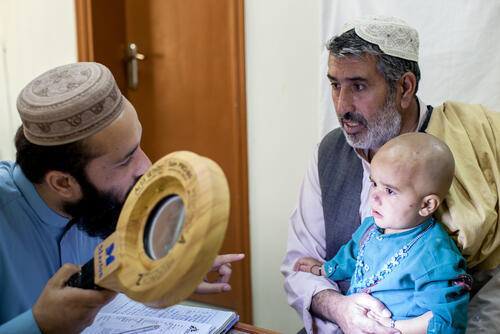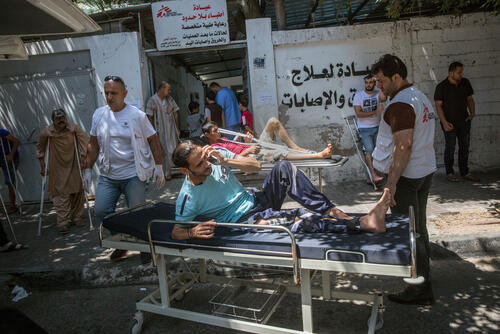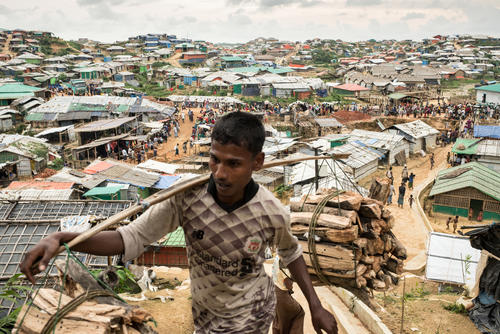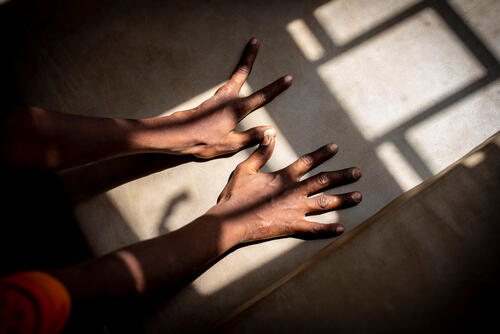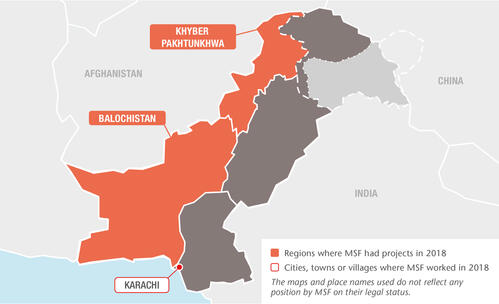
269,200
269,2
29,600
29,6
2,910
2,91

10,900
10,9
1,150
1,15
Pregnant women in Pakistan die from preventable complications during pregnancy and delivery, and newborn care is unavailable in many parts of the country; even where it is available, many cannot afford it.
Mother and child health in Balochistan
In Chaman district headquarters hospital, near the border with Afghanistan, our teams work with the Ministry of Health to provide reproductive, neonatal and paediatric healthcare. We also manage trauma cases in the emergency room and offer inpatient and outpatient nutritional support for malnourished children under the age of five.
These services are available to local residents, Afghan refugees and people who cross the border seeking medical assistance.
In Kuchlak, a town in Quetta district that is home to a large number of Afghan refugees, we manage a health centre offering outpatient treatment for children, including nutritional support for children under the age of five, wound dressing services for children under 12, 24-hour basic emergency obstetric care and psychosocial counselling. Patients with emergency obstetric complications are referred to Quetta.
We also support an inpatient therapeutic feeding programme for severely malnourished children, the general paediatric and neonatal wards, and reproductive healthcare in Dera Murad Jamali district headquarters hospital.
We set up a water treatment plant at the hospital to ensure availability of clean water for patients, their caregivers and medical staff. In the eastern districts of Jaffarabad and Naseerabad, our teams treated over 9,000 malnourished children through a network of outreach sites and mobile clinics.
Emergency, maternal and neonatal care in Khyber Pakhtunkhwa
Around 75 per cent of the patients at the women’s hospital in Peshawar come from rural areas of the district and what were previously known as the Federally Administered Tribal Areas. Neonatal mortality rates are high, and we focus on high-risk pregnancies and people with reduced access to care.
We also provide comprehensive 24-hour emergency obstetric care. In 2018, our team assisted almost 4,900 births and admitted 600 newborns to the neonatal unit.
In Timergara, around 200 kilometres north of Peshawar, we support the district headquarters hospital’s emergency department and offer comprehensive emergency obstetric and neonatal care.
Our team assisted 13,750 births and treated 178,980 patients in the emergency room in 2018. The ‘kangaroo mother care’ unit, where the mother’s body acts as a natural incubator, was expanded from eight to 14 beds.
In response to a large outbreak of diarrhoeal disease early in the year, we set up a treatment centre at the hospital. By July, we had treated over 4,100 people. Since May, MSF international staff have had only intermittent access to the project in Timergara. At the end of the year, the teams were still awaiting permission from the authorities to be present permanently.
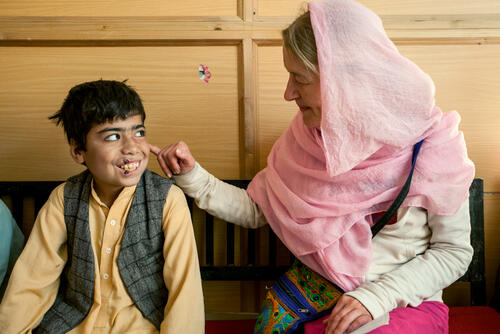
Cutaneous leishmaniasis
In May, we opened our fourth cutaneous leishmaniasis treatment centre in Pakistan. Cutaneous leishmaniasis is a neglected tropical disease that is endemic in Pakistan. Transmitted by the bite of a sandfly, it is characterised by disfiguring and painful skin lesions.
Although not fatal, it often results in stigma and discrimination, affecting patients’ daily life and mental health. The new centre, in Peshawar, was soon working at full capacity, showing the growing need for cutaneous leishmaniasis treatment in the region.
By the end of the year, we had treated 1,380 patients. As well as safe and effective medication, we offered mental health support and raised awareness about treatment and prevention.
Our teams also treated 3,770 patients for the disease in three locations in Quetta district, Balochistan: Kuchlak maternal and child health centre; Bolan medical complex; and Benazir Bhutto hospital.
Hepatitis C
Since 2012, we have been running a clinic in Machar Colony, a densely populated slum in Karachi, where around 150,000 people live in unsanitary conditions with little access to clean drinking water.
In 2018, we decided to close our outpatient department and birthing unit as these services are available at another facility nearby, and focus on diagnosing and treating hepatitis C, a major health concern in Pakistan: it has the second-highest prevalence of the disease in the world.
In 2018, we started 1,146 patients on treatment; by the end of the year, 878 had completed treatment. Our team also offered patient counselling and ran health education activities. Preparations were made to expand the programme into Balochistan in 2019.



